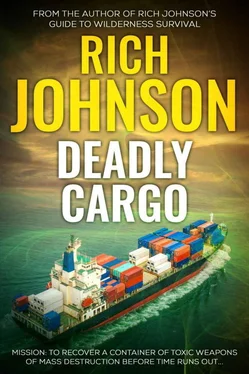“It is good to be appreciated,” Asman Massud said.
“As for this,” Husam al Din said, picking up the tube, “I will be carrying two copies of this flashlight in a small duffel bag. They will be hidden among what will appear to be my personal items and clothing. Tell me how you are planning to rig it.”
Asman Massud took the aluminum body of the flashlight from al Din. “This disc” – he laid the thin aluminum piece in his palm – “will become a false bottom, turning what was once a three-battery flashlight into one that uses only two batteries, and it will be wired so that it will not turn on the light. The vial and the blasting cap will be concealed in the end of the flashlight behind the false bottom. When the cap explodes, it will shatter the vial and pressurize the tube, forcing the toxin out through small holes that I will drill in the end cap. I only need to know the size of the vial.”
Husam al Din unbuttoned his chest pocket and took something out and held it up in the light. “I will use this to serve as the vial. It was made especially for this purpose, with glass that is thin and brittle.”
Asman Massud took the glass tube in his fingers, held it up to the light and examined it closely. Then he picked up a small caliper and checked the dimensions. “This will be perfect,” he said, handing the vial back to Husam al Din. “I will use two small nylon cable ties to secure the blasting cap to the vial.”
“I do not want anyone to hear the explosion,” Husam al Din said. “I want the release to be as quiet as possible. You will need to insulate the flashlight body some way.”
“I can do that,” Asman Massud said proudly. “I can make it so the exploding cap will make no sound. All you will need to do is turn on the flashlight, and the batteries will fire the blasting cap, shattering the vial and releasing the toxin. In your hand, you will feel the detonation, but there will be almost no noise. Perhaps just a dull thud, but you can cover the sound of it with a cough.”
“It is a good plan.” Husam al Din smiled. “I want you to prepare two of these for me, so I will have a back-up. The time cannot come soon enough.”
Josh Adams sat at an aged wooden table with legs that wobbled as he leaned over a large-scale nautical chart of the Port of Miami that was stretched out in front of him. Using a plastic sheet as an overlay, he marked three squares and labeled them – one was the US Customs office; the second was the Coast Guard station; and the third was the Port Security office.
Husam al Din leaned over the table and watched. “Where will the containers be removed from the ship?”
Josh used the marker pen to indicate the area of giant cranes. “This is the terminal where the containers come off the ship. One at a time, they are lifted from the ship’s top deck, then the rest are pulled from the cargo holds. Depending upon the size of the ship, the top deck containers might be stacked as much as six high and ten wide.”
“Then what happens?”
“The cranes lower the containers onto waiting flatbed trucks that haul them away.”
“How long does the process take?”
“To unload an entire ship can take hours. How long it takes to unload your particular container depends upon where it is on the ship. The ones on deck come off first.”
“An estimate?”
“From the time the crane hooks up until the time the container is on the truck, about six minutes. Twice that long, if the box is in the cargo hold. But you have to allow for breaks in the process. These guys are union workers.”
“Tell me about the inspection process, from the time the ship approaches the harbor until the container is on the ground.”
“Even before the ship enters the harbor, it might be boarded by the Coast Guard or Customs to check the manifest and look around. They are free to open and inspect any container they deem suspect. After the ship docks, that same process can happen again, although it is not likely, if the ship has already been inspected at sea. Once the containers start coming off, they hate to slow things down for inspections, although you can’t eliminate the possibility of an inspection once the box is on the truck. There are new radiation screening processes they’re putting the boxes through.”
“From what you saw while working there, what do you think are the chances of an inspection?”
“Radiation screening is a sure thing. A physical inspection with the container getting opened, the percentage is low. A lot depends upon the ship. Container ships are rated according to the TEU capacity. A TEU is a 20-foot equivalent unit. Cargo containers come in 20-foot and 40-foot sizes.”
“Keep going.”
“Well, depending upon which ship we’re talking about, it might be rated at anywhere from 1,500–9,000 TEU capacity. You have to consider that more than 30,000 shipping containers are processed into the US every day, each of them carrying thousands of containers, and there’s not enough manpower to take a look at all of them. Only a very small percentage can be inspected. And only if a container is suspicious will it be deeply inspected.”
“So how do I eliminate the chance of being among even that small percentage? There must be a way. There must be something the authorities look for when they are deciding what to inspect.”
“Yeah,” Josh exhaled, “that’s true. There are key things they watch for, like drugs. They use drug-sniffing dogs for that. And radiation; they use detectors. And irregularities in the manifest. If the cargo is listed as something to be expected, bananas from Costa Rica, for example, they don’t worry too much, especially if the container seal has not been tampered with. If the manifest lists a solid gold Rolls Royce from the Emir of Oman, they might take a look.”
“Then we must create a manifest that will appear to be very normal, so no one will suspect anything. I have a plan for what will be on the manifest, and can get that handled by our people at the point of departure, without any problem.”
“So, where are you shipping from?” Josh asked.
Husam al Din stared hard at him. “I am not sure I want to tell you that.”
“Don’t trust me, huh?” Josh said.
“I haven’t known you long enough. I’m not sure I want to know you long enough. You are an American, an infidel. You are the enemy of my people and of my soul. I will pay you for your information, but that is all.”
“Does Sorgei know?”
“He knows only what I want him to know. That is enough.”
“But I’ll bet he knows more than I do.”
“I have worked with Sorgei before. He has been with our organization for several years,” Husam al Din said. “Still, I tell him only what is necessary. He is a resource. If I need to have him make special arrangements, then I give him the details.”
“How can you trust any Russian after what the Soviets did to Afghanistan?” Josh asked. “We were even helping your guys fight those Soviets – supplying weapons, giving clandestine training to your people.”
Husam al Din looked straight at Josh. “The war with the Soviets is over. The war with America is not. Sorgei hates America. Have you not heard the ancient Pashtun proverb that says the enemy of my enemy is my friend?”
“So you consider me to be your enemy?” Josh asked.
“Are you Muslim?”
“No.”
“Then you are an infidel. You are my enemy.”
“Isn’t Sorgei also an infidel?”
Husam al Din nodded. “He is indeed.”
“Then how can you justify working with either of us?”
“An infidel might be used to help accomplish my greater purposes,” Husam al Din said, “but he is still an infidel.”
Читать дальше












